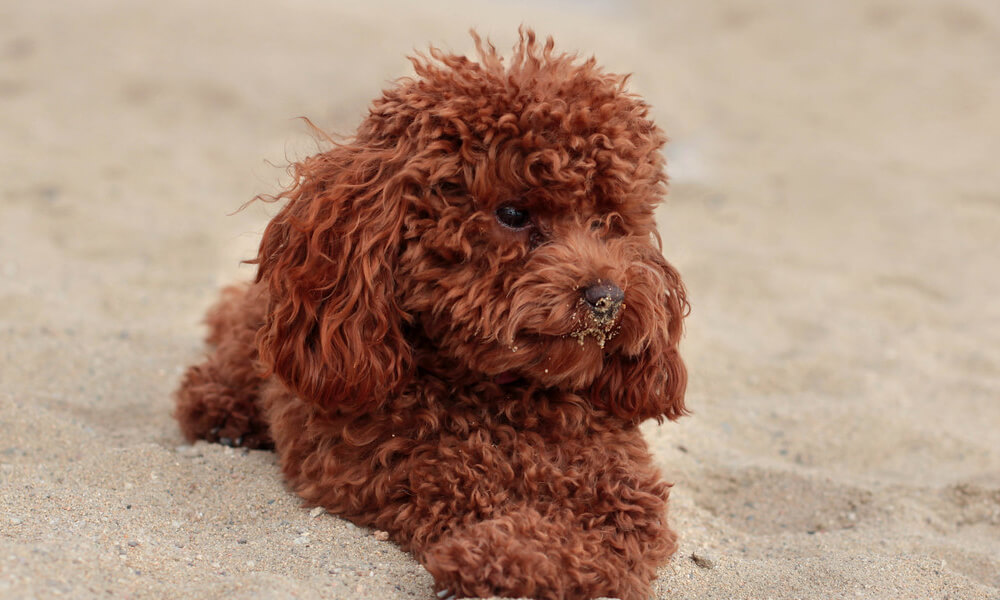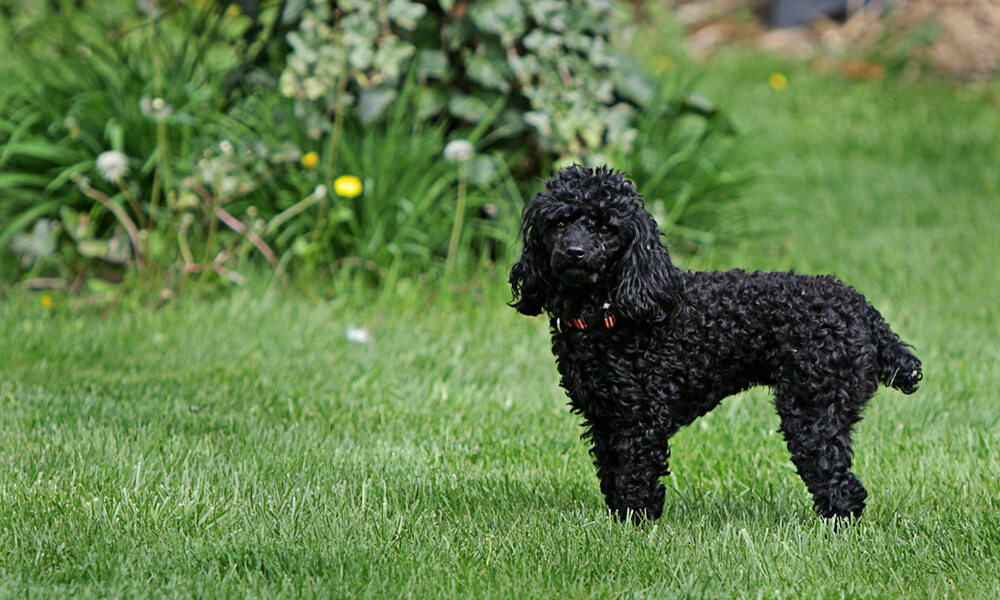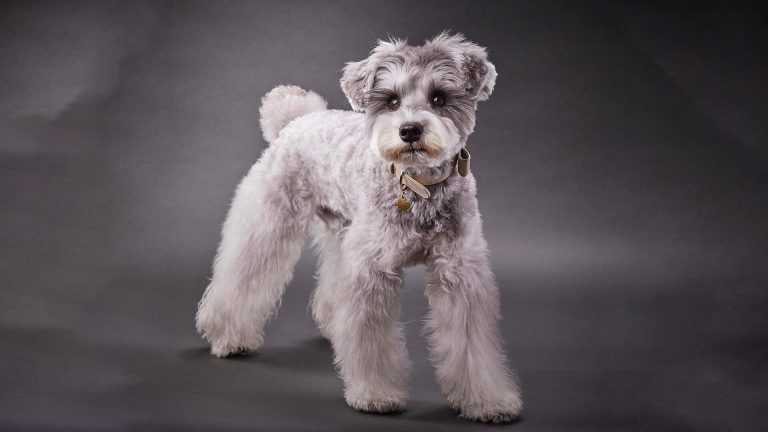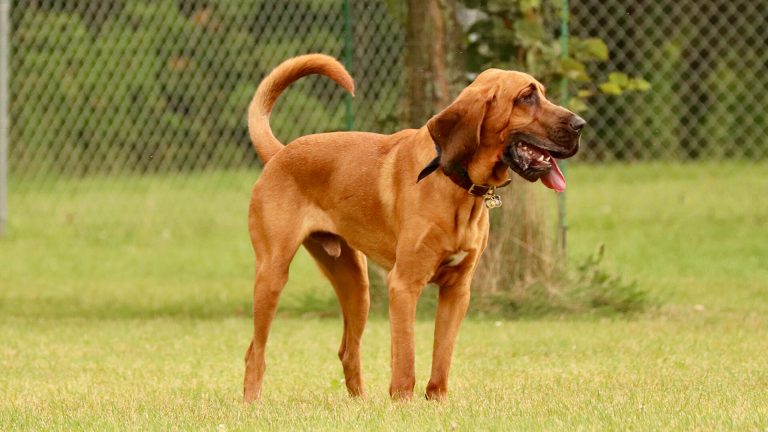The Toy Poodle is a small breed of dog that is believed to have originated in Germany, where it was used as a water retriever. The breed was later developed in France, where it became a popular companion dog and was used in the development of other Poodle breeds such as the Standard and Miniature Poodles. Toy Poodles were recognized by the American Kennel Club (AKC) in 1887.
Distinctive Features of Toy Poodle
| Scientific Name | Canis lupus familiaris |
| Lifespan | Up to 15 years |
| Color | White, black, apricot, silver, blue, brown |
| Size in inches | Up to 10 inches |
| Weight | 4-6 pounds |
| Health Risk | Medium |
| Unique Trait | Curly coat |
| Famous for | Companion dog, performance activities |
| Temperament | Playful, affectionate, eager to please |
| Maintenance | High |
| Adaptability | Medium |
| Behavior with kids | Good |
| Social | Good |
Toy Poodles are small, graceful dogs that are known for their distinctive curly coats and intelligent, playful personalities. They typically weigh between 4 and 6 pounds and stand about 10 inches tall at the shoulder. They come in a variety of colors including white, black, apricot, silver, blue, and brown.
Some of the distinctive features of Toy Poodles include their curly coats, which can be kept in a variety of different styles including the "puppy cut" or "teddy bear cut", their long, floppy ears, and their dark, expressive eyes. They have a lifespan of about 12-15 years.
Toy Poodles are known to be intelligent, trainable, and eager to please, making them well-suited to a variety of different training and performance activities such as obedience, agility, and therapy work. They are also known to be good with children and other pets and make great companion dogs.


How to Take Care of Pet Toy Poodle?
When it comes to owning a Toy Poodle, you can expect a delightful companion that is both elegant and affectionate. With their small size and charming personality, Toy Poodles make excellent lap dogs and are well-suited for apartment living. Their intelligent nature and playful demeanor ensure that you'll never have a dull moment with your beloved Toy Poodle by your side. Taking care of a pet Toy Poodle involves the following:
Set Up a Habitat for Your Pet Toy Poodle
Setting up a habitat for a Toy Poodle involves providing them with the appropriate space, food, water, and bedding.
- Space: Toy Poodles are small dogs and do not require a lot of space, but they should still have a designated area in the home where they can relax and sleep. A small crate or dog bed can work well.
- Food and water: Make sure to provide your Toy Poodle with fresh food and water at all times. You can feed them dry kibble or wet food, but be sure to choose a high-quality brand that is appropriate for their size and age.
- Bedding: Provide a soft and cozy bed for your Toy Poodle to sleep on. A dog bed or a soft blanket will work well.
- Exercise: Toy Poodles are active dogs and need regular exercise to stay healthy. They can be taken for walks or runs, but also enjoy playing fetch or exploring your backyard.
- Grooming: Toy Poodles have a distinctive curly coat that requires regular grooming to keep it looking its best. Brush their coat at least once a week and clip their nails as needed.
- Training and Socialization: Provide regular training and socialization to keep your Toy Poodle well-behaved and well-adjusted. Start early with basic commands, obedience, and socialization, so your dog will be well-behaved and well-adjusted.
- Love and affection: Toy Poodles are companion dogs that thrive on love and affection. Make sure to spend quality time with your pet, playing, cuddling and interacting with them regularly.
What to Feed Your Pet Toy Poodle?
Toy Poodles are small dogs and have different nutritional needs than larger breeds. It is important to feed them a high-quality diet that is appropriate for their size and activity level.
- Dry kibble: A high-quality dry kibble that is specifically formulated for small breeds is a great option for feeding Toy Poodles. Look for a brand that is made with high-quality protein sources, such as chicken or fish, and is free from fillers and artificial ingredients.
- Wet food: Wet food can be a great option for Toy Poodles, especially if they have trouble chewing dry kibble. Look for a brand that is made with high-quality protein sources and is free from fillers and artificial ingredients.
- Homemade food: you can make homemade food for your toy poodle by cooking lean protein such as chicken or fish, and adding vegetables like carrots, green beans, and sweet potatoes. You can also add brown rice or quinoa for carbohydrates.
- Treats: Treats should be given in moderation, and should not exceed 10% of the dog's daily caloric intake. Choose treats that are low in calories and high in protein, like dried liver or cheese.
It's important to always monitor your dog's weight and adjust the amount of food accordingly. It's also important to always have fresh water available for your dog to drink.
It's always best to consult with your veterinarian about your Toy Poodle's specific dietary needs and to ensure that your pet is getting the right balance of nutrients for their size, age, and activity level.
What to Avoid Feeding Your Pet Toy Poodle?
While it's important to provide a balanced diet for your Toy Poodle, there are certain foods that should be avoided in order to keep your pet healthy.
- Table scraps: Avoid feeding your Toy Poodle table scraps as they often contain high amounts of salt, sugar, and fat which can lead to obesity and other health issues.
- Chocolate: Chocolate contains theobromine which can be toxic to dogs and should be avoided.
- Grapes and raisins: Grapes and raisins can be toxic to dogs and can cause kidney failure, even in small amounts.
- Onions and garlic: Onions and garlic contain compounds that can damage a dog's red blood cells and lead to anemia.
- Alcohol: Alcohol should never be given to dogs as it can cause vomiting, diarrhea, and even death.
- Bones: Bones, especially cooked bones, can splinter and cause obstruction or lacerations of the digestive tract.
- Fatty foods: Avoid feeding your Toy Poodle high-fat foods as they can lead to obesity and other health problems.
- Artificial sweeteners: Some artificial sweeteners like Xylitol can be toxic to dogs and should be avoided.
- Avocado: Avocado contains a substance called Persin, which can be toxic and may cause vomiting, diarrhea, and difficulty breathing.
- Raw Eggs: Raw eggs may contain bacteria like Salmonella or can interfere with the absorption of biotin, leading to skin and coat problems.
It is always best to check with your veterinarian before making any changes to your Toy Poodle's diet and to be aware of any specific food allergies or sensitivities that your pet may have.
Brushing, Bathing & Grooming Needs of Your Pet Toy Poodle
Toy Poodles have a distinctive curly coat that requires regular grooming to keep it looking its best. Here are some tips for brushing, bathing, and grooming your Toy Poodle:
- Brushing: Toy Poodles should be brushed at least once a week to remove any tangles or matting in their coat. Use a slicker brush or a metal comb to work through their curls, starting at the tips and working your way up to the roots.
- Bathing: Toy Poodles should be bathed every 4-6 weeks to keep their coat clean and shiny. Use a mild, dog-specific shampoo and be sure to rinse thoroughly to remove any soap residue.
- Grooming: Toy Poodles should be trimmed every 4-6 weeks to keep their coat at a manageable length. You can have a professional groomer or trim them at home. Some popular trim styles include the "puppy cut" or "teddy bear cut".
- Nail trimming: Toy Poodles should have their nails trimmed every 2-4 weeks. Be sure to use a sharp, dog-specific clipper and avoid cutting too close to the quick, which is the sensitive area near the base of the nail.
- Ear cleaning: Toy Poodles have long, floppy ears that can be prone to infections if not kept clean and dry. Use a cotton ball or soft cloth to gently wipe the inside of their ears once a week.
- Dental care: Toy Poodles can be prone to dental problems, so it's important to brush their teeth regularly and provide dental chews to help keep their teeth clean.
By providing regular grooming and care, you can help keep your Toy Poodle healthy and looking their best.
Health Concerns of Pet Toy Poodles
Like all breeds, Toy Poodles are prone to certain health concerns. It is important to be aware of these potential issues and to work with your veterinarian to keep your pet healthy.
- Luxating patella: This is a condition where the kneecap dislocates from its normal position. It can be caused by genetics or injury and can lead to pain and lameness.
- Epilepsy: Toy Poodles can be prone to seizures, which can be caused by genetics or other factors such as head injury or infection.
- Dental problems: Toy Poodles can be prone to dental problems such as tartar buildup and tooth decay. It's important to brush their teeth regularly and to provide dental chews to help keep their teeth clean.
- Bloat: Toy Poodles are prone to a condition called bloat, which is a serious and potentially life-threatening condition that occurs when the stomach fills with gas and twists on itself.
- Allergies: Toy Poodles can be prone to skin allergies, which can cause itching and skin irritation.
- Progressive Retinal Atrophy (PRA): This is a genetic disorder that causes the retina of the eye to degenerate, leading to blindness.
- Ear infections: Toy Poodles have long, floppy ears that can be prone to infections if not kept clean and dry.
- Cushing's disease: Toy poodles can be susceptible to Cushing's disease, causing hormonal imbalances and various symptoms.
- Disc Disease: Toy poodles can be prone to intervertebral disc disease, where the spinal discs degenerate or herniate, leading to pain and mobility issues.
- Legg-Calves-Perthes Disease: Toy poodles can be prone to Legg-Calve-Perthes Disease, a condition causing hip joint degeneration, pain, and limited mobility.
- Mitral Valve Disease: This is a condition characterized by degeneration and dysfunction of the mitral valve in the heart.
It's important to schedule regular check-ups with your veterinarian and to keep an eye out for any signs of illness or discomfort in your Toy Poodle. With proper care and attention, your pet can live a long and happy life.
Training and Playing with Your Pet Toy Poodle
Toy Poodles are intelligent, trainable, and eager to please, making them well-suited to a variety of different training and performance activities. Here are some tips for training and playing with your Toy Poodle:
- Positive reinforcement: Use positive reinforcement techniques such as treats and praise to reward your Toy Poodle for good behavior. This will encourage them to repeat the behavior and make training more enjoyable for both of you.
- Start early: Begin training and socialization as early as possible. The earlier you start, the easier it will be for your Toy Poodle to learn and the better-behaved they will be.
- Basic commands: Teach your Toy Poodle basic commands such as sit, stay, come, and heel. These commands will help you communicate with your pet and keep them safe.
- Obedience training: Enroll your Toy Poodle in an obedience class to teach them more advanced skills and help them learn to interact with other dogs and people.
- Agility training: Toy Poodles are agile and enjoy physical activity, so consider enrolling them in an agility class. This can be a fun way for them to burn energy and bond with you.
- Playtime: Toy Poodles are playful and enjoy interactive toys such as balls and puzzles. Playtime is also a great way to bond with your pet and keep them mentally and physically stimulated.
- Exercise: Toy Poodles are active dogs and need regular exercise to stay healthy. They can be taken for walks or runs, but also enjoy playing fetch or exploring your backyard.
By providing regular training and playtime, you can help keep your Toy Poodle mentally and physically stimulated and well-behaved.
Other Pets to Keep or Avoid with Toy Poodles
Toy Poodles are known to be good with children and other pets, but it is important to consider the personalities and needs of any potential companion animals when making a decision about what other pets to keep with your Toy Poodle.
- Other Poodles: Toy Poodles get along well with other Poodles, especially if they are raised together from a young age.
- Cats: Toy Poodles can be good with cats, especially if they are raised with them from a young age.
- Other small dogs: Toy Poodles can be good with other small dog breeds, as long as they are well-socialized and introduced to each other properly.
- Birds: Toy Poodles can be good with birds, but it is important to supervise them when they are together to ensure that the bird is safe.
- Rodents: Toy Poodles have high prey drive and may not be suitable to keep with small pets such as hamsters, guinea pigs, or rabbits.
- Fish: Toy Poodles are not interested in fish and they are not likely to cause any harm to them.
It's always important to supervise any interactions between your Toy Poodle and other pets, especially during the initial introduction period. You should also consider the personalities, energy levels, and needs of each animal when making a decision about what other pets to keep with your Toy Poodle.
It's always best to consult with your veterinarian or a professional animal behaviorist if you have any concerns about introducing a new pet to your Toy Poodle.
Facts About Toy Poodles
Toy Poodles are a small, intelligent and elegant breed of dog that have been popular for centuries. Here are some facts about Toy Poodles:
- History: The Toy Poodle is believed to have originated in Germany, where it was used as a water retriever. The breed was later developed in France, where it became a popular companion dog.
- Size: Toy Poodles typically weigh between 4 and 6 pounds and stand about 10 inches tall at the shoulder.
- Coat: Toy Poodles have a distinctive curly coat that comes in a variety of colors including white, black, apricot, silver, blue, and brown.
- Intelligence: Toy Poodles are known to be highly intelligent and are easily trained. They excel in obedience and agility training and are known to excel in various performance activities.
- Personality: Toy Poodles are known to be playful, affectionate, and eager to please. They make great companion dogs and are good with children and other pets.
- Lifespan: The average lifespan of a Toy Poodle is 12-15 years.
- Popularity: Toy Poodles have been consistently ranked in the top 20 most popular dog breeds by the American Kennel Club (AKC)
- Hypoallergenic: Toy Poodles are considered hypoallergenic, which means they shed very little and produce less dander, making them a good choice for people with allergies.
- Grooming: Toy Poodles require regular grooming to keep their curly coat looking its best, including regular brushing, clipping and bathing.
- Training: Toy Poodles are highly trainable and respond well to positive reinforcement and consistency. They are known to excel in obedience, agility and therapy work.
What It's Like to Keep a Toy Poodle as a Pet?
Keeping a Toy Poodle as a pet can be a wonderful experience. Here are some things to consider when keeping a Toy Poodle as a pet:
- They are highly intelligent: Toy Poodles are known to be highly intelligent dogs, which makes them easy to train and they excel in obedience and agility training.
- They are good with children: Toy Poodles are known to be good with children, making them a great choice for families with kids.
- They are affectionate: Toy Poodles are known to be affectionate and playful, which makes them great companions.
- They require regular grooming: Toy Poodles have a distinctive curly coat that requires regular grooming to keep it looking its best. This includes regular brushing, clipping, and bathing.
- They are hypoallergenic: Toy Poodles are considered hypoallergenic, which means they shed very little and produce less dander, making them a good choice for people with allergies.
- They need regular exercise: Toy Poodles are active dogs and need regular exercise to stay healthy. They can be taken for walks or runs, but also enjoy playing fetch or exploring your backyard.
- They need proper training: Toy Poodles are highly trainable and respond well to positive reinforcement and consistency. They are known to excel in obedience, agility and therapy work.
- They need socialization: Toy Poodles are social animals, and they need regular socialization to help them interact well with other dogs and people.
Frequently Asked Questions About Toy Poodles
Here are some of the generally asked questions about Toy Poodles:
What is the average lifespan of a Toy Poodle?
Toy Poodles have an average lifespan of 12-15 years.
Do Toy Poodles shed?
Toy Poodles are considered hypoallergenic, which means they shed very little and produce less dander.
Are Toy Poodles good with kids?
Toy Poodles are known to be good with children, making them a great choice for families with kids.
How often do Toy Poodles need to be groomed?
Toy Poodles should be brushed at least once a week, bathed every 4-6 weeks and clipped every 4-6 weeks to keep their coat looking its best.
Are Toy Poodles easy to train?
Toy Poodles are highly intelligent and respond well to positive reinforcement, making them easy to train.
What kind of exercise do Toy Poodles need?
Toy Poodles are active dogs and need regular exercise to stay healthy. They can be taken for walks or runs, but also enjoy playing fetch or exploring your backyard.
Are Toy Poodles good with other pets?
Toy Poodles can be good with other pets, especially if they are well-socialized and introduced to each other properly.
What is the average weight of a Toy Poodle?
Toy Poodles typically weigh between 4 and 6 pounds.
Are Toy Poodles good for apartment living?
Toy Poodles can adapt well to apartment living as long as they get enough exercise and mental stimulation.
Are Toy Poodles prone to certain health concerns?
Yes, Toy Poodles can be prone to certain health concerns such as luxating patella, Cushing's disease, Disc disease, epilepsy, dental problems, bloat, allergies, Legg-Calves-Perthes disease, Mitral valve disease, ear infections and Progressive Retinal Atrophy (PRA). It is important to schedule regular check-ups with your veterinarian and to keep an eye out for any signs of illness or discomfort in your Toy Poodle. With proper care and attention, your pet can live a long and happy life.







